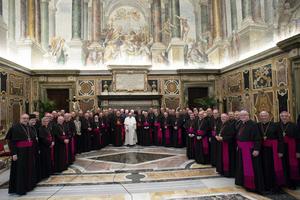The Enduring Lesson of the Persecution of Cardinal Pell
COMMENTARY: Does the Church in Australia realize that the wrongful conviction of Cardinal Pell was an example and warning to all Catholics who might be too open about their Catholic faith?

The emphatic acquittal Tuesday of Cardinal George Pell by Australia’s High Court is a moment of opportunity and testing for the Church in Australia. Will they meet the moment?
The acquittal raises serious questions for the Australian criminal justice system, as I wrote about earlier. Consider this one fact: No judge who had a future to worry about sided with Cardinal Pell. Every judge whose future was secure from recriminations for judging fairly sided with the cardinal.
At the Court of Appeal in Victoria, Justice Mark Weinberg was the dissenting judge, whose 200-page dissent utterly demolished the majority opinion, which upheld the jury convictions. Weinberg is a 71-year-old retired judge who is called in for special cases because of his expertise.
At the High Court, all seven justices — already in the final appointment of their careers and completely immune from future pressure — swatted away the convictions with such force that the whole Australian legal community is reeling. The implausibility of the convictions was matched by the incredulity of the High Court that the Court of Appeal majority could have got it so wretchedly wrong.
That suggests the cultural and political environment in Australia is so toxic for the Catholic Church that a persecution masquerading as a prosecution could be successfully launched against Australia’s most prominent Catholic.
Remember this, too: The utterly fantastic Melbourne cathedral allegations were the most promising case for the prosecutors to pursue. The Victoria Police had solicited a number of even more outrageous claims that never got to trial.
What to call an effort to take down Australia’s most senior prelate in a frenzy of outrage — some of it deserved, but only some — against the Catholic Church?
Persecution.
So suggested a not-very-thinly-veiled tweet from Pope Francis hours after Cardinal Pell’s acquittal:
“In these days of #Lent, we’ve been witnessing the persecution that Jesus underwent and how He was judged ferociously, even though He was innocent.
Let us #PrayTogether today for all those persons who suffer due to an unjust sentence because someone had it in for them.”
That is the enduring lesson of the Pell prosecution: The High Court judgment’s unanimity, clarity and authority made it clear that something horrible had gone wrong. And what had horribly corrupted the administration of justice was the desire to persecute and punish, not prosecute justly.
The Church in Australia is about to embark on an extensive plenary council process, a time of hoped-for renewal and evangelization. But the plenary council will fail if it does not adequately take into account the reality of the situation facing the Church. Preparing missionary disciples for a time of persecution is a rather more daunting affair than blandly discussing how the Church might be relevant to this or that cultural trend or technological innovation.
Does the Church in Australia realize that the wrongful conviction of Cardinal Pell was an example and warning to all Catholics who might be too open about their Catholic faith, too insistent on their rights as Catholic citizens, too convinced that the proclamation of the Gospel is good news for contemporary Australia? It is no accident that the outrages against Cardinal Pell proceeded alongside the egregious assault on religious liberty and the confessional seal.
There are mixed signals. Archbishop Anthony Fisher of Sydney issued a strong statement that the High Court “decision confirms [Pell’s] conviction was wrong.” He went further, asking “that the pursuit of him that brought us to this point now cease.”
“Pursuit” is a diplomatic word for persecution.
On the other hand, the president of the Australian Catholic Bishops’ Conference was studiously neutral. In a remarkable statement, Archbishop Mark Coleridge of Brisbane simply noted that people took different views on the matter:
“Today’s outcome will be welcomed by many, including those who have believed in the cardinal’s innocence throughout this lengthy process. We also recognize that the High Court’s decision will be devastating for others. Many have suffered greatly through the process, which has now reached its conclusion.”
If Archbishop Coleridge’s approach — for the shepherd to take a neutral position between the wolves and the sheep — characterizes the forthcoming Australian plenary council, the Church’s enemies will note that the Church in Australia will cooperate with its exclusion from any meaningful role in the common life of the commonwealth.
The previous president of the Australian bishops’ conference, Archbishop Denis Hart, then the successor to Cardinal Pell in Melbourne, took the same neutral line when Cardinal Pell’s persecution started. His performance added a personal dimension to the preemptive surrender, as he had known the cardinal personally for decades and enjoyed his friendship.
Wednesday of Holy Week is the day of the betrayal of Judas (Matthew 26:14-16). It was on that day, exactly two years ago, when the clarifying moment came in the whole long matter.
Robert Richter, Cardinal Pell’s attorney, asked a member of the Victoria police about Operation Tethering, the investigation launched against Cardinal Pell without any complaints. The operation was intended to solicit complaints wherever they could find them, conjured or otherwise.
“Operation Tethering, that was a ‘get Pell’ operation, wasn’t it?” Richter asked.
“I guess you could term it the way you did,” replied the policeman, adding that he would not call it that.
From that moment it was clear that there was no crime being investigated in order to find a criminal, but a cardinal being investigated to find a crime.
What was done to a cardinal can be done, mutatis mutandis (changing what needs to be changed), to the Church in Australia as a whole. Will it be ready?
Father Raymond J. de Souza is the editor in chief of Convivium magazine.
- Keywords:
- father raymond j. de souza
- pell acquittal

















